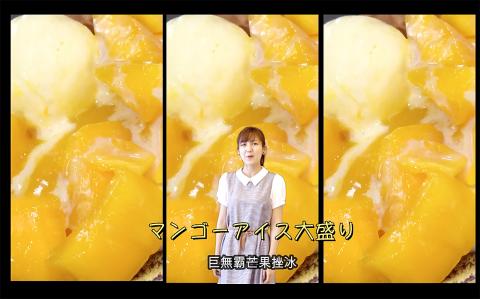A music video introducing Taiwan as a travel destination to Japanese tourists had gone viral as of yesterday morning, accumulating more than 50,000 Facebook views since it was released on Saturday last week.
The video, titled Let’s Meet In Taiwan (我們在台灣見吧), was produced by Taiwanese musician Sandy Huang (黃小玫).
On Facebook, Huang said that she composed a rap song and produced a video for it because her Japanese friends have often asked her about which places they should visit in Taiwan.

Photo: Screengrab from Sandy Huang’s Facebook page
The song is about some of the nation’s tourist attractions, as well as its culture and food.
Huang said she welcomes suggestions about things she forgot to mention in her video, and would try to include them in her next song.
As of press time last night, the video had about 56,000 views and had been shared more than 1,000 times.
One netizen tagged Representative to Japan Frank Hsieh (謝長廷) in a comment, saying that he should consider hiring Huang as the tourism representative in Japan.
Another netizen said that the video fared better than promotional films produced by the Tourism Bureau.
“It is a pity that the Tourism Bureau would never produce a film like yours, no matter how much money they spend. Thank you for producing this video — I will share it with friends from Japan,” she said.
Others said that Huang should mention Taiwan’s mountains and fishing villages in her next song.
Huang’s lyrics are not only about tourist attractions and snacks. They also inform Japanese about the cultural differences between the two nations, such as the high likelihood of finding cilantro in almost every dish they eat in Taiwan.
In the video, Huang says that, unlike Japan’s metro system, where passengers are banned from talking on their mobile phones, but are allowed to eat and drink, the Taipei Mass Rapid Transit (MRT) system bans the consumption of food and beverages, but allows people to talk on their phones.
When taking the escalator in MRT stations, Japanese tourists should remember to stand on right of the escalator if they are not in a hurry, she says, adding that they can lease a YouBike if they are tired of walking in the city.
In the video, Huang also warns Japanese tourists to use traffic signals only as a reference and watch out for cars and motorcycles when crossing the street. She also instructs them to bring their own toilet paper for public toilets, as some places might not provide it.

Taipei has once again made it to the top 100 in Oxford Economics’ Global Cities Index 2025 report, moving up five places from last year to 60. The annual index, which was published last month, evaluated 1,000 of the most populated metropolises based on five indices — economics, human capital, quality of life, environment and governance. New York maintained its top spot this year, placing first in the economics index thanks to the strength of its vibrant financial industry and economic stability. Taipei ranked 263rd in economics, 44th in human capital, 15th in quality of life, 284th for environment and 75th in governance,

Greenpeace yesterday said that it is to appeal a decision last month by the Taipei High Administrative Court to dismiss its 2021 lawsuit against the Ministry of Economic Affairs over “loose” regulations governing major corporate electricity consumers. The climate-related lawsuit — the first of its kind in Taiwan — sought to require the government to enforce higher green energy thresholds on major corporations to reduce emissions in light of climate change and an uptick in extreme weather. The suit, filed by Greenpeace East Asia, the Environmental Jurists Association and four individual plaintiffs, was dismissed on May 8 following four years of litigation. The

A former officer in China’s People’s Liberation Army (PLA) who witnessed the aftermath of the 1989 Tiananmen Square massacre has warned that Taiwan could face a similar fate if China attempts to unify the country by force. Li Xiaoming (李曉明), who was deployed to Beijing as a junior officer during the crackdown, said Taiwanese people should study the massacre carefully, because it offers a glimpse of what Beijing is willing to do to suppress dissent. “What happened in Tiananmen Square could happen in Taiwan too,” Li told CNA in a May 22 interview, ahead of the massacre’s 36th anniversary. “If Taiwanese students or

The New Taipei City Government would assist relatives of those killed or injured in last month’s car-ramming incident in Sansia District (三峽) to secure compensation, Mayor Hou You-yi (侯友宜) said yesterday, two days after the driver died in a hospital. “The city government will do its best to help the relatives of the car crash incident seek compensation,” Hou said. The mayor also said that the city’s Legal Affairs, Education and Social Welfare departments have established a joint mechanism to “provide coordinated assistance” to victims and their families. Three people were killed and 12 injured when a car plowed into schoolchildren and their